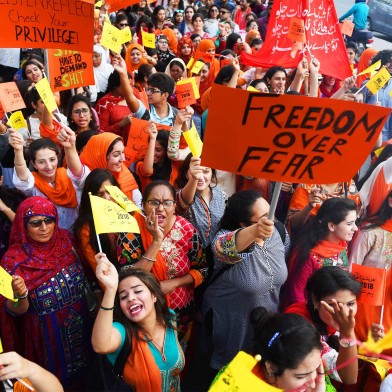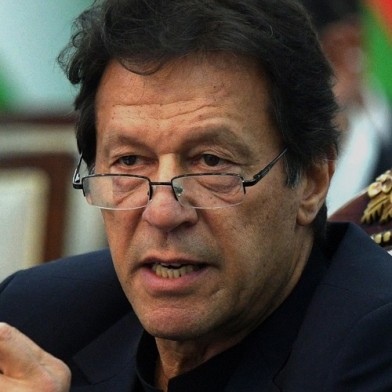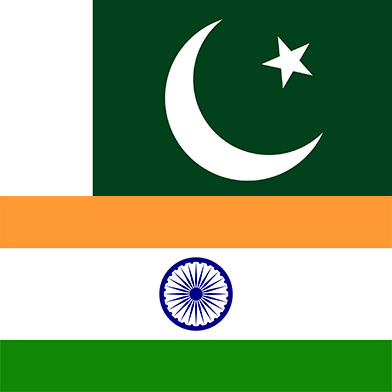With gender and minority rights and freedom of media expression taking a nosedive in Pakistan in 2020, a culture of censorship and lack of accountability has grown more powerful than ever, writes Reem Wasay.
Warning: This essay contains descriptions of sexual assault
Coughing and spluttering its way through a global pandemic (with limited, questionable success), Pakistan found itself gasping for air for entirely different reasons in 2020.
Human Rights Watch, in its World Report 2021, recently released dismal findings on the state of women's, minorities and transgender rights, and on the state of social, religious, political and media freedoms.
Prime Minister Imran Khan's government seems to have asserted a particularly dogmatic dissertation on what constitutes moral content, permissible political activity and sanctioned social pastimes.

Pakistan Prime Minister Imran Khan. Photo: Wikimedia Commons
A growing crackdown on journalists and media personnel has cultivated a caustic culture of self-censorship whereby newspaper articles, television news shows, and editorials are either blocked or taken off the airways completely if they are seen as criticising the government or the armed forces.
Pakistani human rights advocates and dissenters don't seem to be safe anywhere in the world - two firebrand human rights campaigners from the restive Balochistan province, which is heavily under army control, were found dead drowned in murky waters, leaving a trail of unanswered questions: in May 2020, Baloch journalist, Sajid Hussain, was found drifting in a river in Uppsala, Sweden after being missing for two months, and, in December, Baloch student and women's rights campaigner, Karima Baloch was found dead in Toronto's Lake Ontario.
Both had fled the country due to threats to their lives. Both are now dead. Whilst the causes behind their deaths are still not clear, what is clear is that Pakistan remains one of the most dangerous countries in the world for journalists.
This fear for life extends beyond advocacy and the media.
The consistent rise of incidents of violence against anyone accused of blasphemy in the country serves as a reminder that the sway demonstrated by religious extremism is at an all-time high.
The Ahmadiyya community, a minority sect that has been ex-communicated from Islam in the constitution of Pakistan, continues to face inordinate levels of barbarity due to accusations of alleged blasphemy - a series of archaic laws, introduced in the 1980s, to punish blasphemers to death for any perceived instance of blasphemy.
No reforms or amendments have been allowed into this law, resulting in extrajudicial killings when zealots take the law into their own hands. At least four Ahmedis were murdered in blasphemy related incidents last year and countless arrests have been made.
Gag orders on social media are also rife - in May, popular video-sharing app TikTok was banned for being immoral and going against Islamic values, an almost always convenient pretext upon which to shrink public space for creativity and individual expression. Access to the app was restored after 10 days but the ban served as a reminder that moral congress was a government mandate.
Less than a week ago, at a press briefing, Khan implored the people to not strive for the establishment of a 'soft image' of Pakistan just to appease the west.
Women were also served a sobering rejoinder: nowhere was safe, no matter where you came from. The motorway rape case - a heinous incident in which a woman was dragged out of her car, after it had run out of fuel, and raped in front of her minor children - in September, stirred outrage because of police reaction to the crime.
Victim blaming took on a new low when a senior police official admonished the victim for having left her home at night, not travelling with a male chaperone, and not checking the fuel before setting out. The case was a sullied suggestion that rape is not a man's crime, it is a woman's shame.

A demonstration held in Pakistan, in response to the death of Karima Baloch. Photo: Wikimedia Commons
Instances of child sex abuse increased in 2020, with figures as high as an average of six children being abused every day in the first six months of the year - perpetrators are hardly ever brought to book with families typically wanting to bury such stigma from societal view.
Pakistan's Lahore High Court did abolish the debasing 'two-finger virginity test' in January this year, a move that has come some 100 years too late but has finally been outlawed. According to this test, doctors test the veracity of a rape victims claims by manually inserting two-fingers into a woman's vagina to test for a hymen and to check its laxness. This is to determine the extent of a woman's sexual activity. The test has long been a symbol of the country's patriarchal structures that shift the blame of sex crimes onto women.
If 2020 was anything to go by, Pakistan continued more of the same in its targeted offensive against women, minorities, and dissenting voices but with an unfortunate upward trajectory.
The opinions expressed in this article are those of the author.
- Asia Media Centre


